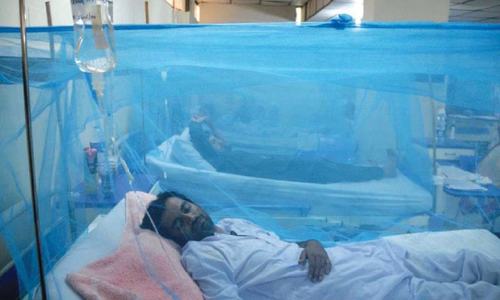ISLAMABAD: As many as 8,933 dengue cases have been reported from across the country, while 16 people lost their lives during the current year.
Briefing the media here on Thursday, Chief of Disease Surveillance Division at the National Institute of Health (NIH) Dr Rana Safdar said that 2,132 cases were reported from Sindh, 2,076 from Punjab, 1,772 from Balochistan, 1,612 from Khyber Pakhtunkhwa, 1,206 from the federal capital and 92 from Azad Jammu and Kashmir.
Twin cities of Islamabad and Rawalpindi have been badly hit by the disease, while 43 cases were notified in Punjab from other provinces.
“As many as eight casualties have been reported from Sindh, three each from Islamabad and Balochistan, and two deaths have been reported from Punjab,” he said.
Dr Safdar said that within Rawalpindi, clustering of cases had been observed in Airport Housing Society, Gulbahar Scheme, Wakeel Colony, Dhoke Munshi and Kot Jabbi, while in Islamabad cases were reported from Mohra Nagial and UC Kirpa.
Of samples tested by the NIH from twin cities, DEN2 [type-2 of dengue virus] had been isolated as was the case in the 2017 outbreak as well, he added.
“Field response is under way in the identified hotspots in Rawalpindi and Islamabad focusing awareness raising and vector control i.e. distribution of bed nets among confirmed cases, vector control through larva source management activities in houses, covering/sealing of open water containers and distribution of larvicidal chemicals, door-to-door distribution of pamphlets/hand bills, announcements from mosques, and group meetings in the affected community,” Dr Safdar said.
He added that after a meeting presided over by the Rawalpindi commissioner, semi-government and private hospitals had allocated 260 beds for treatment of dengue patients. Holy Family Hospital has been tasked with training the staff of those hospitals.
In reply to a question, Dr Safdar said that the Field Epidemiology and Disease Surveillance Division was activated on Sept 6 to monitor the progression and a daily situation report was being disseminated.
“The Seasonal Awareness and Alert Letter and Advisory on Prevention and Control has been widely disseminated and made available at NIH website. A 10-member team having onboard epidemiologists, entomologists and communication experts is notified to provide technical support to provincial health departments as requested,” he said.
He added that dengue is a mosquito-borne viral infection transmitted by the female mosquitoes of the species Aedes Aegypti and, to a lesser extent, Ae. Albopictus. This mosquito also transmits Chikungunya, Yellow Fever and Zika infection.
Published in Dawn, September 20th, 2019













































